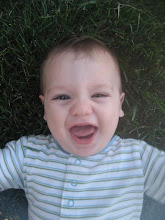Why Wear Baby?
- Baby-wearing recreates the oneness of the baby and mother that existed in the womb which is absolutely necessary for proper development of the infant and the mother’s levels of mothering hormone, prolactin.
Baby-wearing provides fathers a way to share the nurturing as well as enhances bonding in the family.
Baby-carrying helps the baby maintain equilibrium and provides movement to the baby in all three directions, essential to proprioception (body awareness).
Baby-carrying provides the natural rhythm of movement and tactile stimulation that small babies need for proper neurological development. Constantly carried babies fall asleep quickly in the comfort of their sling – some babies may always fall asleep while carried.
Baby-carrying stimulates optimal development of the cerebellum of the brain, the only part of the brain that continually increases in cells as the baby gets older.
Baby-carrying enables the mother to be acutely responsive and aware of her baby’s cues and signals. Baby-carrying increases maternal sensitivity and heightens parent’s perceptions of their children’s needs. Mothers become so sensitive to their baby that they can anticipate hunger needs, waking, and the need for a clean diaper.
Baby-carrying allows the baby to be an active participant in the walking, talking, laughing, movement, and working of the parent.
Baby-wearing in a sling or backpack is the most comfortable and easy way to hold baby on the parent’s shoulders, backs and hips. Baby-wearing distributes weight evenly from parent’s shoulders to hips and aligns baby’s center of gravity as close to parent’s body as possible. Plastic carseat carriers create severe torsion and strain in the caregiver’s back and arms, and an unnatural gait.
Babies are easy to wear and parents learn to relax and touch, even if they were not touched often as children or are awkward with physical intimacy and closeness.
Carrying infants lowers the level of stress hormones and adrenalin circulating in the blood stream of the infant, as well as the parent/caregiver.
Babies that are carried develop a strong bond with their mothers and a solid emotional security pattern in the foundations of their psyche.
Baby carrying greatly reduces crying and fussiness (one study reported in the 1986 Paediatrics Medical Journal found 43% less crying during the day and 51% less at night), mothers feel more competent and nurturing toward their infant and are less likely to act in abusive ways towards their children. This author found that baby-carrying resulted in crying less than 1% of the time for the first year of the baby’s life.
Continuously carried infants actually initiate separation faster and become more emotionally self-reliant.
Baby-carrying creates autonomy as well as a healthy development of physical intimacy and touching between parents and children.- Baby-carrying gives healthy messages of touching to children and they learn to give and receive affection and touching in healthy ways. Carried infants are less likely to have sexual problems later in life.
Babies who are touched and carried continuously develop larger brains than infants who are denied this stimulation.
Babies who are carried have a lower mortality rate than infants who are denied this constant contact.
Baby-carrying greatly benefits premature infants and lowers their mortality rate (called Kangaroo care in Neonatal nursing).
Babies who are carried cry less, smile more, are less prone to vomiting and spitting up.
Infants who are carried experience reduced or little incidence of colic.
Carried babies experience an enhanced degree of bonding with their caregiver.
Baby-carrying develops bonding and attachment between parent and child, shows love and affection, and parental-child love is expressed and actively demonstrated on a constant basis.
Baby-carrying tells children they are loved, safe, secured and cared for.
Baby-carrying allows children to be AT the center of activity rather than being the center of attention, which is a healthy atmosphere for development of empathy, affection and a healthy sense of self.
Baby-carrying offers constant and easy access to the infant’s food source, mother’s breastmilk.
Babies sleep comfortably and for longer periods of time while carried.
Babies who are carried have a solid sense of self-esteem and independence.
Carrying of the infant is the most important factor responsible for the infant’s normal and social development.
Baby-carrying is a natural soothing baby tranquilizer which helps fussy or tired infants fall asleep.
Baby-carrying stimulates the tactile receptors in the skin, developing muscle tone, increases cardiac output which increases circulation, promotes respiration and aids in digestion.
Baby-carrying on the body provides the elements of pressure, motion, pleasure, warmth, security, sound that is essential to the development of the vestibular nervous system during infant development.
Baby-carrying provides the exact level and kind of stimulation an infant requires, energizing their nervous system and providing quiet and calm alertness in the infant.
Older infants learn more as they are in a vertical position or semi-vertical position which encourages an alert state of arousal.- Baby-carrying develops the muscles needed for the infant to sit, stand and walk. The baby must use his muscles to fight gravity and hold his head up, building necessary muscle strength, control, and coordination.
Baby carrying constantly allows the baby to complete its extra-uterine gestation period which is needed for the proper development and health of the infant.
Baby-carrying creates an intuitive sensitivity that allows mother to anticipate her baby’s every mood and need and fully experience the joy of mothering.
Babywearing can help reduce the severity of postpartum depression in mothers who have had negative or endocrine-disrupting (epidurals and/or IV pitocin)) birth/delivery experiences, and can help stabilize new mother emotions.



No comments:
Post a Comment